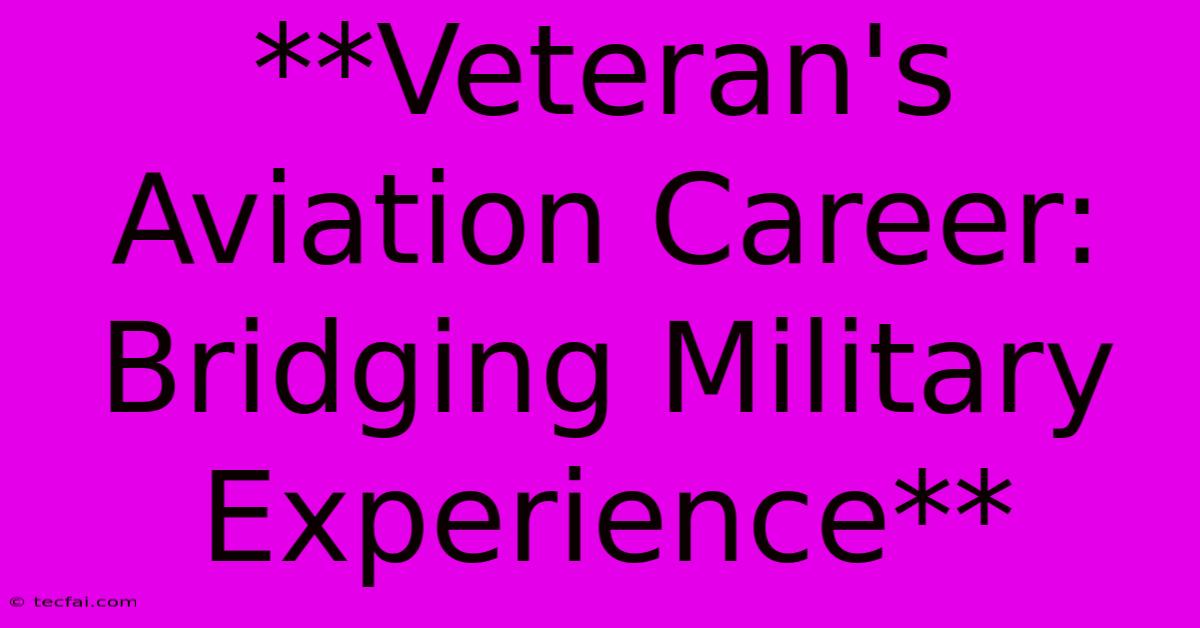**Veteran's Aviation Career: Bridging Military Experience**

Discover more detailed and exciting information on our website. Click the link below to start your adventure: Visit Best Website tecfai.com. Don't miss out!
Table of Contents
Veteran's Aviation Career: Bridging Military Experience
The transition from military service to civilian life can be challenging, but for veterans with aviation experience, the path to a successful career in the industry is paved with valuable skills and knowledge. The aviation sector actively seeks individuals with the discipline, teamwork, and technical expertise gained through military service. This article will guide veterans through the process of leveraging their military aviation experience to build a thriving career in the civilian world.
The Transferable Skills of a Military Aviator
Military aviation encompasses a wide range of disciplines, equipping veterans with a unique skill set highly sought after in the civilian aviation sector. Here are some key transferable skills:
- Technical Proficiency: Military aviators are trained on complex aircraft systems and possess a deep understanding of aircraft maintenance, navigation, and flight operations. This technical expertise is invaluable in civilian aviation roles.
- Leadership and Teamwork: The military fosters strong leadership qualities and the ability to work effectively in teams under pressure. These skills are crucial in aviation environments, where safety and efficiency are paramount.
- Problem-Solving and Decision-Making: Military aviation involves complex decision-making in high-stakes situations. Veterans bring a keen ability to analyze situations, assess risks, and make sound decisions quickly.
- Discipline and Work Ethic: Military service instills a strong work ethic, discipline, and dedication to excellence. These qualities are highly valued by employers in the aviation industry.
Career Pathways for Veterans in Aviation
The aviation industry offers a diverse range of career opportunities for veterans, from flight operations to maintenance and management. Here are some potential paths:
1. Commercial Airline Pilots: Veterans with commercial pilot licenses and sufficient flight hours can pursue careers as airline pilots. The experience gained in the military can be a strong asset in the airline industry.
2. Corporate Aviation: Veterans with experience in military flight operations are well-suited for roles in corporate aviation, operating private jets for businesses and individuals.
3. Flight Instructor: Veterans with a passion for aviation and a strong understanding of flight principles can pursue a career as a flight instructor, training aspiring pilots.
4. Aviation Maintenance Technicians: Veterans with experience in aircraft maintenance can find fulfilling careers as aircraft mechanics or technicians in the commercial, corporate, or general aviation sectors.
5. Air Traffic Control: The skills and discipline acquired in the military are highly relevant for air traffic controllers, responsible for managing the flow of aircraft in and out of airports.
6. Aviation Management: Veterans with strong leadership and organizational skills can find success in aviation management roles, overseeing various aspects of aviation operations.
Resources and Programs for Veterans in Aviation
There are several resources and programs specifically designed to assist veterans in transitioning into aviation careers:
- The Department of Veterans Affairs (VA): The VA offers various benefits and services for veterans, including job training and employment assistance.
- The Veterans Employment and Training Service (VETS): VETS provides resources and support to veterans seeking employment, including job placement services and resume workshops.
- Industry Organizations: The National Air Transportation Association (NATA) and the Air Line Pilots Association (ALPA) offer programs and resources specifically tailored for veterans in the aviation industry.
Tips for Success
- Network: Attend industry events, connect with veteran groups, and utilize professional networking platforms to build connections and learn about opportunities.
- Highlight Transferable Skills: Tailor your resume and cover letter to emphasize how your military experience translates to the specific skills required for the aviation job you are seeking.
- Certifications and Licenses: Obtain relevant certifications and licenses, such as a commercial pilot license or an airframe and powerplant (A&P) mechanic certificate.
- Continue Your Education: Consider pursuing additional education or training to enhance your qualifications and expand your career options.
Conclusion
Veterans with aviation experience possess a unique blend of skills and expertise highly valued in the civilian aviation industry. By leveraging their military background, pursuing relevant certifications and licenses, and actively networking, veterans can successfully navigate the transition and build rewarding careers in the exciting world of aviation.

Thank you for visiting our website wich cover about **Veteran's Aviation Career: Bridging Military Experience**. We hope the information provided has been useful to you. Feel free to contact us if you have any questions or need further assistance. See you next time and dont miss to bookmark.
Featured Posts
-
Panahon Odds At Score Clippers Vs Thunder
Nov 12, 2024
-
Clark County Marine Remembered In Ceremony
Nov 12, 2024
-
Tesla Stock Rallies On Musk Trump Tie
Nov 12, 2024
-
Gabon Lesotho Referees Named For Atlas Lions
Nov 12, 2024
-
Trump Era Stocks Outpacing Teslas Growth
Nov 12, 2024
